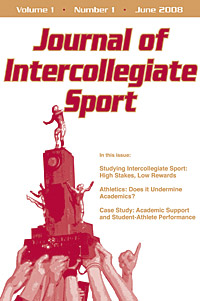NCAA News Archive - 2008
« back to 2008 | Back to NCAA News Archive Index
|
The NCAA News
Research on intercollegiate athletics figures to get a shot in the arm in the coming months as Human Kinetics begins publishing a biannual Journal of Intercollegiate Sport.
The inaugural issue to be published in June includes the four papers and reactions from the NCAA’s first Scholarly Colloquium in January that broached whether college sports was a legitimate research focus for scholars. The answer there was a resounding “yes,” and now scholars will have a high-profile publication in which to share their findings.
Human Kinetics, a world-renown publisher that for more than three decades has published books and journals focusing on health and sport movement, will add the Journal of Intercollegiate Sport to its offerings – with the annual June issue devoted to Colloquium papers and the December edition featuring a juried collection from additional scholars.
“Research on sport – particularly intercollegiate sport – has not typically been a front-and-center agenda item for academics,” said Penn State Faculty Athletics Representative Scott Kretchmar, who chairs a 16-member editorial board that oversees both the administration of the Colloquia and selection of Journal papers. “It is difficult research to do and there often is a cultural bias toward writing on a subject some may perceive as trivial.
“Part of the premise for the Colloquium and the Journal is to stimulate reputable academics looking at college sport to give those who govern the enterprise better information on which to base decisions. Over time, with what we think will be a very visible and credible journal, we believe we’ll encourage more researchers to consider intercollegiate sport as a good topic to study.”
A “call for papers” has been issued for the second issue of the Journal – submissions are due September 1. Kretchmar said each journal will be 160-180 pages, which translates to about six to 10 papers. Selections will be based on merit – “That is to say we are not predisposed toward a topic or kind of information,” Kretchmar said – and as long as articles are not redundant, there may be multiple selections on a similar theme.
A Web site (http://mc.manuscriptcentral.com/hk_jis) is being developed for online submissions, but Kretchmar said the site won’t be ready until May. In the meantime, scholars can submit papers directly to Kretchmar at rsk1@psu.edu.
Submissions will be processed through a “blind review.” Papers minus the author’s name will be distributed to one board member and one guest reviewer outside the board. The board member or Kretchmar himself will select the latter based on the potential reviewer’s expertise in the topic area.
The Journal, funded in part by a start-up grant from the NCAA, is an inter-disciplinary (open to people from all different research backgrounds) and cross-disciplinary (topics may employ more than one discipline) publication, and authors are encouraged to write their articles “for an educated, lay readership” and refrain from “field-specific jargon.”
NCAA faculty athletics representatives will receive complimentary subscriptions to the Journal, which Kretchmar believes could stimulate that constituency into being content providers.
“FARs already compose a group that has self-identified as being interested in sport,” he noted, “so a few of them may realize that they can use their disciplinary skills to look at sport and do research in that area. We want the Journal to be an engine that spurs new research, some of which we would expect to come from faculty reps.”
Submission guidelines for the Journal make it clear that papers “must reflect good scientific procedure, the best practices of qualitative methodologies, and/or sustained and effective argumentation.” Submissions that are primarily editorial or polemical in nature (rather than scholarly) are discouraged.
“On the other hand,” Kretchmar said, “a good research paper that happens to be critical of the status quo – whether it be critical of the NCAA or the intercollegiate athletics enterprise – is welcome. Understanding the weaknesses of the athletics enterprise will help leaders make more informed decisions.”
Further submission guidelines are available on the Journal of Intercollegiate Sport Web site. The call for papers will be promoted in several publications, including Sociology of Sport Journal, Recreational Sports Journal, Sport Management News, Athletic Therapy Today, the Journal of Sport Management, the Journal of Sport Rehabilitation and the International Journal of Sport Communication.
In addition to overseeing the Journal, the editorial board also is planning for the next Colloquium, to be held once again in conjunction with the NCAA Convention January 13-14 in Washington, D.C. Kretchmar said the theme for the second annual event will examine whether excellence in sport is compatible with good health.
The third Colloquium will be at the 2010 NCAA Convention in Atlanta. Click here for an NCAA News story previewing the inaugural Colloquium.

